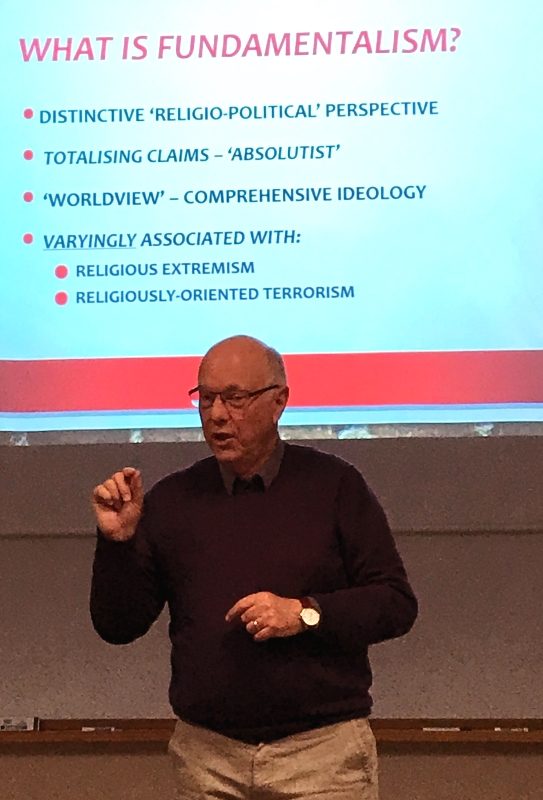Until a community can recognise that its religious ideology can manifest extremism, it would not be able to address the problem and stop it.
Waikato University expert on religion and religious terrorism Professor Douglas Pratt said from the Thugees of India through the Sicarii (Jewish extremists) through to the Spanish Inquisition, there has been a long association between terror and religion.
Professor Pratt gave a special talk at an event put on by the Religious Diversity Centre Trust at the University of Otago in Auckland on June 26.
He noted how, in the case of Muslim terrorism at present, people would say the terrorists are not real Muslims.
But he said, all religions can be practised to the extreme. “No religious system is immune from these kinds of developments,” he explained.
“My argument would be: until a community can recognise and accept that people within their community are actually manifesting an extremism of their ideology then they won’t be able to identify where this is coming from and how to contain and neutralise this on their own,” he said.
Professor Pratt said there is a difference between fundamentalism and extremism.
Fundamentalism, he said, is not necessarily extremism. It involved a worldview that sees society as failing and is now in a moral panic. Fundamentalism has a “them” and “us” mentality.
“You get the values: the negation of otherness, the show of self-superiority,” he explained.
Professor Pratt said when the belief becomes impositional, then it becomes extremism.
“There is a sense of aggressiveness coming through to the point where the religious ideology or the group that manifests that wants to impose that on society or everyone else,” he said. “That’s the mark of the extremist.”
Professor Pratt said extremism with religious roots is even more dangerous.
“When religion empowers political terrorism then the terrorism apparently has no limits and acknowledges no boundaries,” he said, explaining that religion provides some kind of licence that even political ideology might not go far into: “God told me to.”
With the Muslim extremists sowing terror, a counter-religious extremism is growing elsewhere in the world. One of the contemporary example in the US is the Church of Jesus Christ Christian/Aryan Nations (CJCC/AN) which sees Jesus not as a Jew, but a member of the Aryan race.
“It’s a rallying point for many US hardline white supremacists because it adopts the Christian ideology,” he said.
He also cited the Stop the Minaret movement in Switzerland where the building of minarets (slender towers of mosques) was banned.
“The fear was that if Islam gets a foothold, it will prevent the freedom of religion. In order to ensure freedom of religion, they must prevent this religion. So, you get this total paradox coming through,” he said.
The question to be asked he said is,“what is to be feared: Muslims and Islam or the engendered fear of Muslim and Islam?”
Professor Pratt said religions contain “high values of peace, justice and community harmony, but equally, they contain the seeds of exclusive rejection, the basis of fundamentalism and extremism”.
“Combatting extremism requires understanding religious ideology correctly, winning the battle of ideas which [is] the real war on terrorism and challenging and changing destructive religious ideologies,” he said.
Religious Studies waning
Religion has impacted much of our lives but the secular society seemed to have lost that fact, said Waikato University Religious Studies Professor Douglas Pratt.
“When we have to fly naked, that is when the terrorists have won because I can’t think of anything more terrifying,” he said, humourously commenting on the fact that travellers are sometimes asked to strip at the US airports for security reasons.
“We live in challenging times, that’s for sure. Without any sophisticated or nuanced understanding of any religion, the risk as I see it is an apathetic and ignorant population is susceptible to shift into naive religion and from there into fundamentalism,” he said.
Investing in religious studies, however, does not seem to be a priority for universities around the country as fundings become stretched.
Professor Pratt admitted that the University of Waikato is shutting down religious studies by the end of the year. “It’s quite clear there would be no more religious studies because [of] economic things, not enough students take it,” he said.
Presbyterian Rev. Dr Carolyn Kelly, who is a chaplain at the University of Auckland, said religious discourse is not seen as something worth investing on in this country.
“The state doesn’t invest in the religious line of thought because we are supposedly secular, even though it has been shown that an increasingly significant section of New Zealand is not secular,” she said.
“We say we’re concerned about religious freedom but actually we’re not investing in [it]. We’re not dealing with pro-active faith. We’re not having an educated and thriving religious discourse in the public sphere,” she added.
Professor Pratt said in teaching religious studies, he was often humbled at seeing the level of ignorance about religion. He said he would encounter people who did not know, for example, that Islam is a religion. “They thought it was a political movement,” he said.
Professor Pratt added that a significant issue in New Zealand is “while we have a lot of good Muslims, prayer leaders and Imams, there are very few Muslim scholars as such”.
In countries like Indonesia, Germany and Australia, governments put funds in the establishment of centres for Islamic excellence.

Reader Interactions